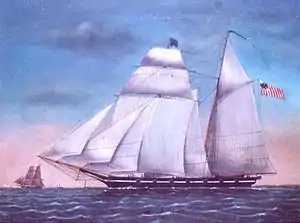 A Morris-Taney-class revenue cutter | |
| Class overview | |
|---|---|
| Builders | Webb & Allen, New York City |
| Operators | United States Revenue-Marine |
| Built | 1830–1833 |
| In service | 1830–1865 |
| Completed | 13 |
| Lost | 2 |
| General characteristics | |
| Type | Revenue cutter |
| Displacement | 112 tons |
| Length | 78 ft (24 m) |
| Beam | 21 ft 3 in (6.48 m) |
| Draft | 7 ft 8 in (2.34 m) |
| Sail plan | Topsail Schooner |
| Complement | 20-24 |
| Armament | Typically 4 × 6 or 9-pounder guns |
The Morris-Taney-class revenue cutters were 13 cutters built at New York City at the Webb and Allen shipyard between 1830 and 1833. These cutters were the backbone of the United States Revenue-Marine for more than a decade. Samuel Humphreys designed these cutters for roles as diverse as fighting pirates, privateers, combating smugglers and operating with naval forces. He designed the vessels on a naval schooner concept. They had Baltimore Clipper lines. The vessels, built by Webb and Allen, were designed by Isaac Webb and resembled Humphreys' design but had one less port.[1]
According to William Thiessen, this was the first class of cutters where all ships were identical.[2]
Ships
| Name | Commissioned | Decommissioned | Notes |
|---|---|---|---|
| Crawford | 1830 | 1835 | Sold. |
| Dexter | 1830 | 1841 | Sold. |
| Gallatin | 1830 | 1849 | Transferred to the United States Coast Survey. |
| Hamilton | 1830 | 1853 | Lost in a gale, 1853. |
| Morris | 1831 | 1846 | Sold. |
| Rush | 1831 | 1840 | Transferred to the Lighthouse Service. Sold, 1848. |
| Wolcott | 1831 | 1846 | Transferred to the Lighthouse Service, 1849. Sold, 1851. |
| Ingham | 1832 | 1836 | Sold to the Republic of Texas. |
| Jackson | 1832 | 1865 | Sold. |
| McLane | 1832 | 1840 | Sold. |
| Jefferson | 1833 | 1847 | Renamed Crawford, 1839. Wrecked, 1847. |
| Taney | 1834 | 1858 | Sold. |
| Washington | 1833 | 1837 | Sold. |
References
- ↑ "U.S. Coast Guard Cutter History". uscg.mil. 2012. Retrieved 2 July 2012.
- ↑
Diana Sherbs (2017-11-30). "The Long Blue Line: Fast Response Cutters – the mainstay of the Coast Guard's coastal patrol fleet". US Coast Guard. Retrieved 2017-12-12.
In 1830, the United States Revenue Cutter Service, predecessor to the modern Coast Guard, launched its first standardized multi-ship class of cutters. The Morris-Class, named for the first cutter in the class, Robert Morris, was designed with a topsail-schooner rig and a length of 78 feet.
This article is issued from Wikipedia. The text is licensed under Creative Commons - Attribution - Sharealike. Additional terms may apply for the media files.